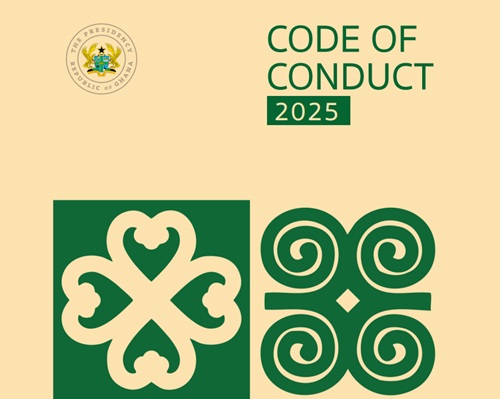President John Dramani Mahama has launched a comprehensive Code of Conduct for all political appointees under his administration, setting out strict ethical guidelines aimed at restoring integrity, discipline, and public trust in governance.
The new Code, unveiled at Jubilee House on Monday, May 5, applies to all ministers, deputy ministers, presidential staffers, CEOs of state institutions, board members, Council of State members, and includes the President and Vice-President.
“This document is not a ceremonial one,” President Mahama said during the launch. “It is a living and enforceable code that spells out what is expected of every individual appointed under this administration. This is a government of shared responsibility, and there will be no sacred cows.”
The Code outlines clear rules against the misuse of office, gift-taking, nepotism, and unethical conduct. Appointees are strictly prohibited from accepting gifts or favours from individuals or companies with a stake in government decisions.
“If a gift is received during an official engagement and its estimated value exceeds GH¢20,000, it must be declared,” the President said. “And upon leaving office, the gift must be surrendered unless the President grants written permission for it to be retained.”
Mr Mahama also banned the use of government funds—including internally generated funds—for hampers and gifts. The only exception, he noted, would be “modest gifts to staff in recognition of excellence or on retirement,” which must be budgeted for and approved by the Chief of Staff.
The 22-page Code, which was reviewed by the Ghana Integrity Initiative (GII), contains wide-ranging provisions covering conflict of interest, political neutrality, transparency in procurement, protection of state assets, and respect for the rule of law.
Appointees must declare any private business interests, particularly those related to government contracts or agencies. They are also barred from using their influence to secure jobs or contracts for relatives or associates.
“Public perception matters,” Mr Mahama said. “If your actions give even the appearance of bias, you compromise the integrity of your office.”
Travel by appointees outside Ghana now requires prior approval from the Chief of Staff, regardless of whether it is official or private. A report must be submitted within 14 days after returning. Retroactive approvals, the President warned, “will no longer be entertained.”
In a notable shift, the Code completely bars political appointees from purchasing state assets—land, vehicles, buildings or shares—either directly or through third parties. “If you attempt to do so and you are found out, your appointment will be terminated,” Mr Mahama warned.
To enforce the new measures, the President announced a whistleblower portal for citizens to confidentially report misconduct. Sanctions for breaches will include reprimand, suspension, and dismissal.
The President also referred to his earlier directive requiring all political appointees who took office before March 31, 2025, to declare their assets or face penalties.
“If by close of day Wednesday, May 7, 2025, you still have not declared your assets, count yourself automatically dismissed,” he said.
Appointees who failed to comply with the directive will forfeit three months’ salary in addition to the one-month salary previously mandated as a donation to the MahamaCares Trust Fund.
Describing the Code as “strict but necessary,” Mr Mahama urged full compliance.
“If you abide by this Code, it will help restore the faith of our people in our democracy,” he concluded. “Let us walk this path together with discipline, humility and a clear sense of duty to the people of Ghana.”
Read the entire Code of Conduct below;
Code of Conduct and Ethics for all political appointees by Kweku Zurek on Scribd

